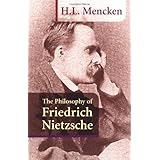
Average Reviews:

(More customer reviews)Are you looking to buy The Philosophy of Friedrich Nietzsche? Here is the right place to find the great deals. we can offer discounts of up to 90% on The Philosophy of Friedrich Nietzsche. Check out the link below:
>> Click Here to See Compare Prices and Get the Best Offers
The Philosophy of Friedrich Nietzsche ReviewThe first thing that needs to be said about this book is that, as an exposition of Nietzsche's philosophy, it's profoundly flawed. Of course it doesn't claim to be exhaustively comprehensive, and today most of its readers will be drawn as much to the author and his interpretation as to the subject itself. But here the interpretation effectively buries the subject. In his own lifetime Nietzsche observed that in most cases "whoever thought he had understood something of me had made up something out of me after his own image (Ecce Homo III I)," and such is the case of Mencken.Symptomatic of this is Mencken's tendency to blithely dismiss (as "sheer lunacy", p.85, or "absurd", p.154) whatever in Nietzsche he fails to properly understand or finds to be at odds with his own reading. But the main problem is not so much in this, nor in his omissions, nor in his over-simplifications, nor even in his errors as such; as the introduction quite rightly notes, Mencken is "dead wrong" in equating Nietzsche's will to power with Schopenhauer's will to existence. The real problem is that, in so thoroughly misunderstanding this & other such key aspects of Nietzsche's philosophy, Mencken inevitably, and substantially, misunderstands that philosophy as a whole.
In this particular case, whereas a -higher- and -fuller- existence is seen by Nietzsche as the aim of the will to power, and hence the greatest good, Mencken's misinterpretation takes existence in itself to be the goal (eg, pp.81-83) and thereby interprets the overman as the man most fit to survive the Darwinian struggle for existence (pp.67, 79, etc.). In fact, Nietzsche repeatedly insisted that it is the mediocre who are most successful as far as mere survival goes ("the last man lives longest" Zarathustra Prologue 5; "species do -not- grow in perfection; the weak prevail over the strong again & again" Twilight of Idols IX 14), and by contrast frequently laments the fragility of the higher man ("the ruination of the higher man, of souls of a stranger type, is the rule" Beyond Good and Evil 269, see also 276 & 62, inter alia).
Another example, the more lamentable for the sheer intellectual laziness it represents on Mencken's part, is his chapter on "Truth". Now, Nietzsche's critiques of objectivity and of the limits of conscious reason, as notably in BGE & TOI, are among the most brilliant and influential things he ever wrote. Yet Mencken wastes half the chapter in a pedantic general discussion of truth, then finally turns to Nietzsche by announcing his views are too complicated to be summarized in the available space, proceeds to misrepresent them, and concludes with the patently false assertion that Nietzsche was a moral ("atheistic") determinist.
More unfortunate still, and far less forgiveable coming after the century of further Nietzsche scholarship which has been undertaken since Mencken first wrote, is that this book's introduction, which is supposed to be there to catch Mencken's errors, cheers him on in this one, as well as as in others. Let it be noted too, in passing, how absurd it it when the author of this introduction complains about the lack of clarity in Nietzsche's style--nevermind the countless passages (the Gay Science 381 is especially instructive, but see also Zarathustra, BGE, EH...) in which Nietzsche addresses the issue of style, connecting it with his conception of the order of rank. In other words, his style is a reflection of his philosophy and can't be criticized in isolation from it, any more than one can speak of Plato's use of dialectic as a mere question of style.
As a final point, this particular edition of Mencken's work is further unsatisfactory in its sloppy editing and in its lack of corrections for those facts Mencken gives about Nietzsche's life which are objectively wrong (generally he was as accurate as possible for his time, but since them far more material has come to light--about Nietzsche's relationship with Lou Salomé, for example, not to mention that awful sister of his, who in Mencken's time was still posing as the--largely unquestioned--voice of authority in all things concerning her brother).
To be fair one might find this book worthwhile for a number of reasons; as an example of how Nietzsche was often understood when his influence was first making itself felt; as one of the earliest works of an exceptional man in his own right; and there are even parts which do serve their intended purpose quite well (I think Nietzsche would have entirely approved of the chapter on Education). Finally I myself found Mencken useful here as a sort of intellectual sparring partner; having read a good deal of Nietzsche, I wanted to sort out my own thoughts by putting them up against those of another intelligent but non-specialist reader. So the book does have its uses, just not the one it claims to.The Philosophy of Friedrich Nietzsche Overview
Want to learn more information about The Philosophy of Friedrich Nietzsche?
>> Click Here to See All Customer Reviews & Ratings Now
0 comments:
Post a Comment